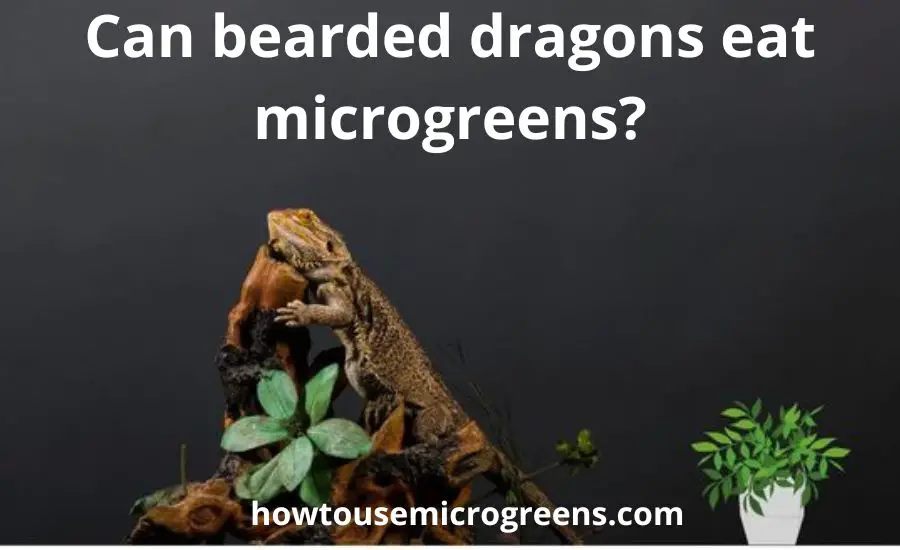Keeping bearded dragons as pets is fun, but there are still plenty of questions and tips to bear in mind. A well-balanced diet is one of the most popular topics for the reptile enthusiasts. What foods are healthy for bearded dragons? Can bearded dragons eat microgreens? What if I give my dragon the wrong food item?
Don’t panic! We are here to equip you with some tips on your pet’s diet arrangement!
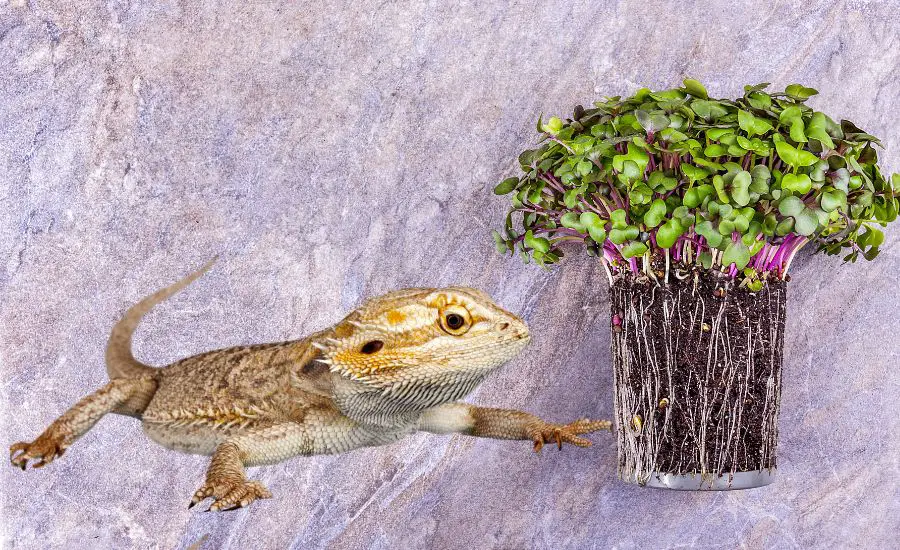
Contents
Can bearded dragons eat microgreens?
As you can guess, bearded dragons can eat microgreens! Moreover, they need microgreens to increase the nutritional value of their menu and maintain optimal health.
By nature, microgreens are small edible seedlings that you harvest a few days after germination. These tiny greens are a well-known source of different essential nutrients. Each of them is incredibly full of vitamins, minerals, and antioxidants.
Since they are young, the concentration of nutrients is especially high.
In addition, some microgreens have very high antibacterial properties. Generally, they are a great addition to anyone’s healthy diet, including the reptiles as well.
The first point to know is that bearded dragons are omnivores, so they require a varied diet. Along with a good amount of proteins, bearded dragons require green food as well. In other words, introducing microgreens to the bearded dragon’s diet is definitely a good idea.
A perfectly balanced diet for bearded dragons includes fruits, veggies, leafy greens, microgreens, and some types of insects. All these foods have their specific nutritional benefits that work best in the smart combination.
However, are all the microgreens good for your bearded dragon? Which of them should you add to your bearded dragon’s diet, and which have you to avoid?
Let’s find out more about the best-balanced diet for your lizard friend!
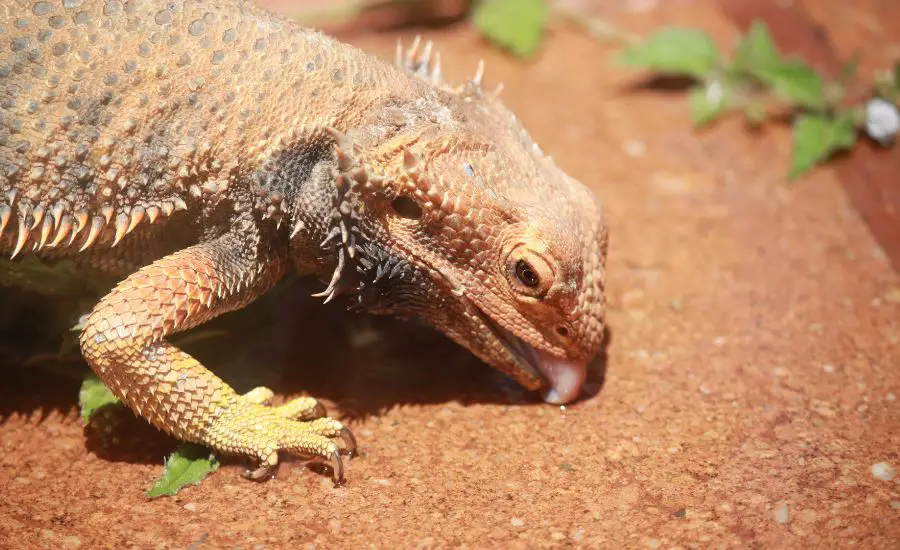
What microgreens are good for bearded dragons?
If you wonder how difficult it is to seduce your bearded dragon to eat microgreens, the answer is very optimistic. Since dragons are not finicky eaters, they will love a green part of their menu.
Opt for the microgreens and leafy greens that provide essential vitamins and nutrients to your bearded dragon. There are some common health issues for domestic bearded dragons, so the right diet is a great natural way to prevent them.
For example, kale microgreens are one of the safest for your bearded dragon. They are packed with vitamin C and essential minerals such as calcium and iron. All these are essential nutrients for your dragon’s health.
As for the healthy leafy greens, opt for such varieties as collard greens, which are packed with vitamins and fiber, and can efficiently prevent digestive problems.
Here is a list of the best microgreens that are suitable for adding to your dragon’s diet:
- Arugula microgreens (rich in vitamin K: maintain bone health and prevent blood clotting)
- Broccoli microgreens (rich in vitamin C; maintain the immune, skin, and eyesight conditions)
- Cilantro microgreens (high in antioxidants: prevent cancerous diseases and purify the dragon’s liver)
- Kale microgreens (high in vitamin C; maintain bones health and stabilize calcium absorption)
In addition, provide your bearded dragon with various leafy greens that are both healthy and tasty for them:
- Alfalfa sprouts
- Collard greens
- Dandelion greens
- Mustard greens
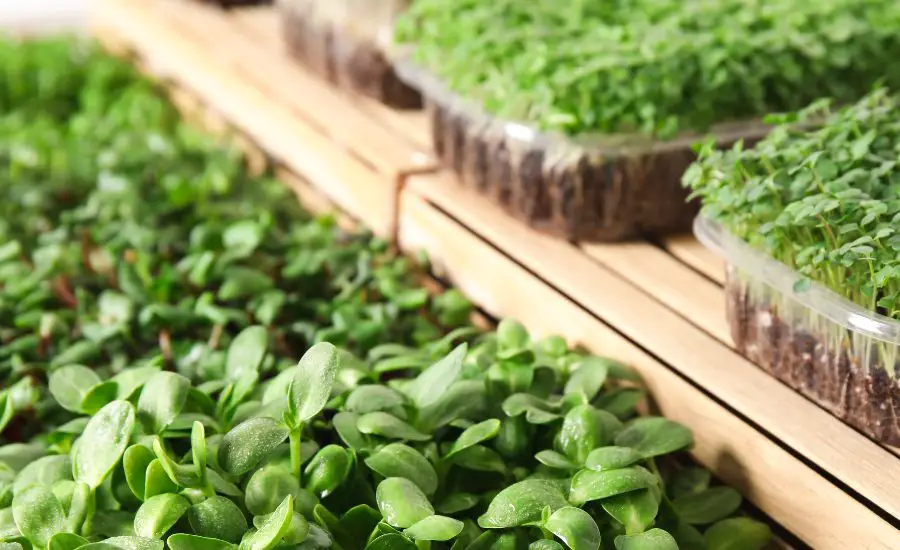
6 smart tips on feeding microgreens to your bearded dragon
As you already know, microgreens are essential to maintain the optimal health of your bearded dragon.
Feeding microgreens to your bearded dragon is not a science, but still requires some smart tips.
So, here is a simple pack of hacks for the reptile owners:
Tip #1: Veggies are crucial for bearded dragons
Always remember that fruits and vegetables make up an essential part of the dragon’s diet! Along with protein sources, provide your beardies with a lot of vegetable food.
Make sure that fruit, veggies, microgreens, and other leafy greens make up a big part of your lizard’s menu. Since these foods are packed with plenty of vitamins, minerals, and antioxidants, it is a great natural way to prevent many health issues.
Add microgreens to your bearded dragon’s diet to maintain the overall health of your scaly friend. Never skip giving vegetable foods to provide your pet with all the essential nutrients!
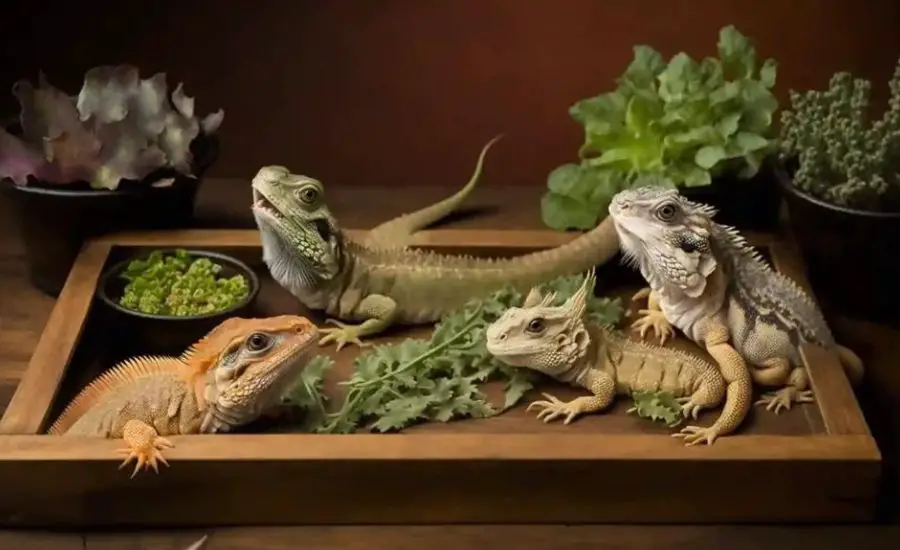
Tip #2: Watch out for the wrong greens
Before you try a new element in the regular menu, keep in mind that not all microgreens are good to include in your bearded dragon’s diet.
Avoid feeding microgreens that are rich in oxalates. Be careful when feeding beet or spinach microgreens, as they are highly packed with oxalates and other nutrients.
Since oxalates are prone to bind with calcium, they cause problems with their absorption. As a result, your bearded dragon can suffer from metabolic bone disease. Too much phosphorus can lead to the same health issue, so be careful with microgreens that are high in this element.
If you opt for the beet or spinach microgreens, be sure to give them occasionally and in minimal amounts. As they are high in oxalates, too much of these greens can impact calcium absorption.
In addition, opt for homegrown organic microgreens instead of buying them at the local store. Since you can’t say for sure what chemicals have been used on these microgreens, there is a risk of some health problems for your bearded dragon.
Here is a list of veggies to avoid or lessen in consumption:
- Beet microgreens
- Potato cops
- Rhubarb leaves
- Spinach
- Swiss chard
- Tomato vines
Never give your dragon any of this vegetation as they are poisonous:
- Daffodils
- Foxglove
- Mistletoe
- Oleander
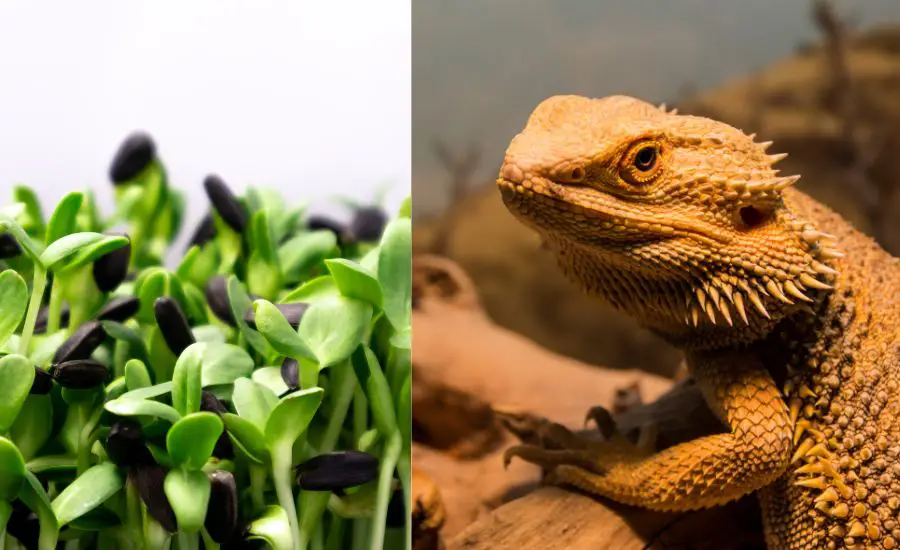
Tip #3: Age matters
When planning the best nutrition for your bearded dragons, always consider their age. Please keep in mind that adult dragons require a bit different menu than the baby ones.
Remember that baby bearded dragons need more proteins as they are growing.
To strengthen their organisms, they need a diet that is high in calcium and proteins.
On the contrary, adult bearded dragons require more veggie foods to maintain their overall health.
Tip #4: Prepare smartly
Always prepare microgreens before feeding your pets. This point is especially true about the bought microgreens that can be full of chemical contaminants.
Never forget to wash microgreens before feeding your bearded dragons! As the bought greens can contain poisonous chemicals, wash them thoroughly in clean tap water.
If you are not going to feed microgreens to your bearded dragon right now, absorb the excess moisture with a clean paper towel. When you keep microgreens for later, the accumulated moisture can cause mold. By no means, bearded dragons can eat microgreens that have any mold traces.
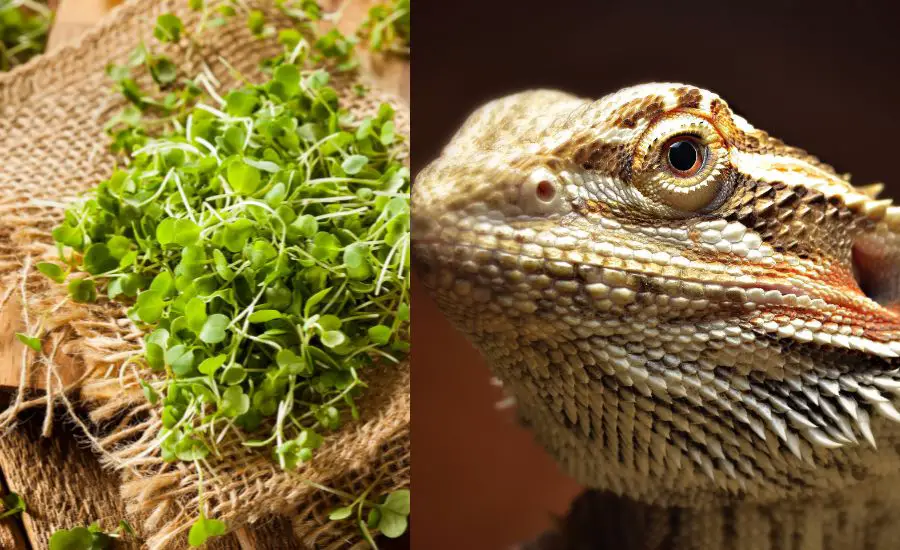
Tip #5: Feed smartly
A great rule of thumb is to feed microgreens to your bearded dragons as a snack. Since any microgreens have too high levels of nutrients, be careful so as not to overdose. A too-nutritious diet is not good at all, as the accumulated oxalates and some other contaminants can lead to some health problems for your bearded dragon.
- Decide how often you are going to feed microgreens to your bearded pet. Never feed them too often! Microgreens work best as a tasty and healthy treat.
- Try with a small amount to watch your bearded dragon’s reaction. Wait for a while to see if your dragon likes it and watch out for any extra reactions.
- Mix them with other leafy green vegetables in the amount that your bearded dragons can eat per meal.
Tip #6: Monitor your bearded dragon’s condition
Last but definitely not least is that you have to monitor your bearded dragon’s health in response to the new foods.
As soon as you start feeding microgreens to your scaly friend, start monitoring such things as appetite, digestive issues, behavior, weight, and general health condition.
If something goes wrong, it is a sign to stop feeding this type of microgreen to your dragon immediately.
If you can see the positive results, you can alternate your bearded dragon’s favorite microgreens to provide a diverse diet!
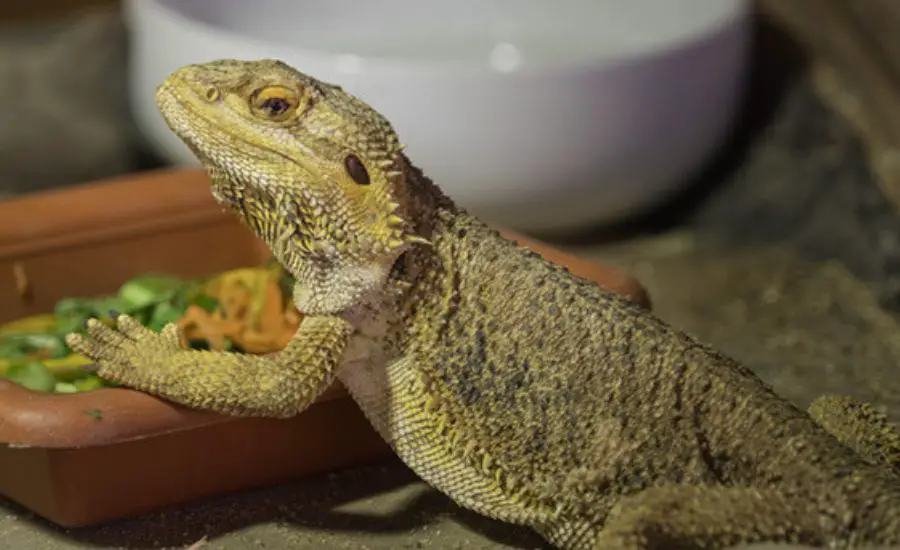
FAQ
Are microgreens good for reptiles?
As microgreens are much higher in nutrients (up to 40x) than adult greens, they can be a great addition to your scaly pet’s diet. Feed your reptiles with a smart amount of microgreens to keep them strong and healthy!
Remember that your pets need proteins as well, so a balanced diet is always crucial. Don’t even try to keep them on a green diet, as the only right way is to combine different food items.
Can bearded dragons eat pea microgreens?
Since they are rich in vitamins A and K, pea microgreens are a good snack for bearded dragons. However, avoid feeding too many pea microgreens to your bearded dragons, as these greens are too high in phosphorus. Remember that excess phosphorus can impact your bearded dragon’s bone health.
Can bearded dragons eat radish microgreens?
By taste, radish microgreens are quite similar to mustard greens, so your bearded dragon will absolutely love them. As they are high in vitamins, such as A, B6, C, and K, they will be a good supplement for your lizard friend.
Radish microgreens are also rich in fiber and contain lots of minerals, such as calcium, iron, magnesium, and potassium. Finally, their antibacterial properties can defeat the harmful bacteria that are occasionally consumed. As you can see, radish microgreens are a healthy addition to your pet’s menu.
Final thoughts
Now you are equipped with all the tips on feeding microgreens to your bearded dragon. Keep in mind that the right menu helps your lovely pet to stay healthy!

